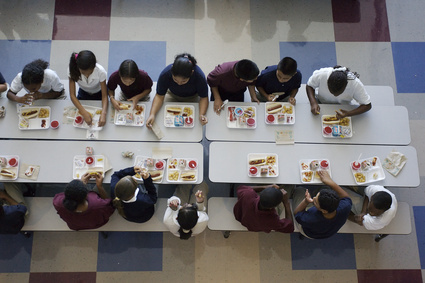A couple of weeks ago, the Chicago Public Schools’ (CPS) inspector general, James Sullivan, released a report noting some curious dealings between the district’s head of food service Louise Esaian and a couple of the district’s food vendors:
Now, Esaian and two members of her staff are accused in a report by CPS inspector general James Sullivan of accepting perhaps thousands of dollars in gifts from Chartwells and another vendor, Preferred Meals Systems, that have combined food contracts at CPS in excess of $75 million.
[…]
Sullivan’s report chronicled dozens of instances where it said Esaian met with officials from either Chartwells or Preferred for dinners and drinks. In addition to candy, flowers and liquor, company executives allegedly bought Esaian a $250 spa gift card at Macy’s on her birthday and a $140 etched crystal hologram of her parents.
Esaian took over as head of CPS food services in 2007, when Arne Duncan, current Secretary of Education, was superintendent of Chicago Public Schools. During this time, Chartwells-Thompson–the district’s food vendor mentioned in the inspector general’s report–started a pilot program to provide free breakfast in some elementary schools. In the last five years, this program has expanded to nearly two hundred schools district wide, which has increased Chartwells-Thompson’s contract by ten million taxpayer dollars. On Wednesday, Esaian resigned from her position with Chicago Public Schools following the release of this report and after coming under fire from city and school district officials. Over the past five years, she had received thousands of dollars in gifts from the district’s vendors; meanwhile she was supporting contracts that would reward these companies.
Flashback to last April when the Chicago Public Schools came under fire after news emerged that children at a west side elementary school were banned from bringing their lunch from home, thus requiring students to eat the lunch provided by the school. The school district stated that they allow each individual school’s principal to decide whether or not homemade lunches are prohibited. You know, it’s for the children! The principal at Little Villages Academy, one of the schools where lunches from home were banned, stated:
Principal Elsa Carmona said her intention is to protect students from their own unhealthful food choices.
“Nutrition wise, it is better for the children to eat at the school,” Carmona said. “It’s about the nutrition and the excellent quality food that they are able to serve (in the lunchroom). It’s milk versus a Coke. But with allergies and any medical issue, of course, we would make an exception.”
Carmona said she created the policy six years ago after watching students bring “bottles of soda and flaming hot chips” on field trips for their lunch. Although she would not name any other schools that employ such practices, she said it was fairly common.
Such local district policies are implemented under the guise of improved child nutrition , but in actuality, such policies served to fill the pockets of vendors connected with school officials. The Chicago Tribune noted last April (emphasis mine):
Any school that bans homemade lunches also puts more money in the pockets of the district’s food provider, Chartwells-Thompson.The federal government pays the district for each free or reduced-price lunch taken, and the caterer receives a set fee from the district per lunch.
Chartwells-Thompson is the same vendor that lavished gifts on CPS’s Esaian and who were included in a contract worth 75 million in taxpayer dollars. As noted, each school determines whether or not they will ban homemade lunches, but as the district’s food service director, Easian also helped guide the process of school provided meals. In addition to ushering in the previously mentioned “free” school breakfast pilot program, she had directed a process that steered more business to the vendor that had given her gifts. The adage says there’s no such thing as a free lunch, but that seems to only apply to Chicago area taxpayers, not school officials.
Often times, such school lunch bans and policies are criticized as an inhibiting parental liberty, and rightfully so. Parents should be able to decide for their children what they deem best for their personal development and nutrition. However, such policies–whether they are local or national–implemented under of the pretext of improved child nutrition often also have the ulterior motive of rewarding the cronies of officials and politicians. Such was the likely case when President Obama signed the Healthy, Hunger-Free Kids Act in December 2010. This bill increased funding for school lunch programs and reimbursed schools at a higher rate to offset the cost of more healthy foods. This legislation was championed by First Lady Michelle Obama as part of her “Let’s Move” initiative. As Michelle Malkin noted when the bill was being considered, expansion of school lunch programs meant a “mandate for higher wages, increased benefits, and guaranteed health insurance” for tens of the thousands of SEIU ( a service workers’ union) represented individuals who work as school lunch servers. SEIU’s PAC spent $27 million in support of Obama’s campaign in 2008 and will spend millions more this election cycle in support of the President. Just as the CPS official-tied food vendor Chartwells-Thompson was the beneficiary of close ties to an official, so was the SEIU–as they often are.
The Obama administration aimed to reward SEIU for their political and financial support by enacting legislation that would be beneficial to the union, and on a local level a school official rewards vendors with taxpayer funded contracts after the vendor lavished her with gifts. There is a saying that notes that all politics is local. This story proves that the same could be said for cronyism; it’s the Chicago way.

COMMENTS
Please let us know if you're having issues with commenting.